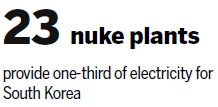Deal curbs ability to reprocess spent fuel
The Republic of Korea and the United States reached a deal on Wednesday to revise a 40-year-old civil nuclear pact that gives the Asian country limited freedom to produce fuel for power generation but continues to curb its ability to reprocess spent fuel.
The deal paves the way for the ROK to enrich uranium to produce nonweapons grade nuclear fuel under guidelines to be drawn up by the two countries, and also requires the United States to ensure it a stable supply of fuel for nuclear reactors, according to the ROK's Foreign Ministry.
The agreement, which still needs approvals in both countries, contains no provision to allow the ROK independently to manage spent nuclear fuel through reprocessing, although it opened the way for easier movement of spent fuel to a third country for disposal.
The ROK, which runs 23 nuclear power stations that provide a third of its power, has pushed for greater leeway to manage its nuclear fuel and had sought to revise the original pact with Washington to let it reprocess spent fuel.
But reprocessing of spent fuel is a thorny diplomatic issue because of proliferation concerns, especially on the Korean Peninsula, where the Democratic People's Republic of Korea has defied efforts by the international community and pushed to develop nuclear weapons.

The ROK's nuclear reactors add a total of 750 metric tons of spent fuel every year to the 13,300 tons that filled 71 percent of its storage capacity as of 2013, according to operator Korea Hydro and Nuclear Power.
US Ambassador to the ROK Mark Lippert said the deal reaffirms the two countries' commitment to nonproliferation of nuclear arms while addressing the ROK's need for stable fuel supply and spent fuel management.
"The proposed agreement is one of the most sophisticated and dynamic peaceful nuclear cooperation agreements we've ever negotiated," Lippert said.
Talks began in October 2010 on revising the 1974 pact, which banned the ROK from reprocessing spent fuel for fear of proliferation because it could yield weapons-grade plutonium.
The ROK has strongly pushed for US permission to recycle spent fuel for power generation, saying its storage facilities for spent fuel will reach capacity in 2016.
US officials have expressed concern that such a move might undermine global nonproliferation efforts and provoke the DPRK and Japan.
As a solution, the ROK proposed "pyroprocessing", a new technology considered less conducive to producing weapons because it leaves separated plutonium mixed with safer fissile materials.
Reuters - AFP
(China Daily 04/23/2015 page11)














